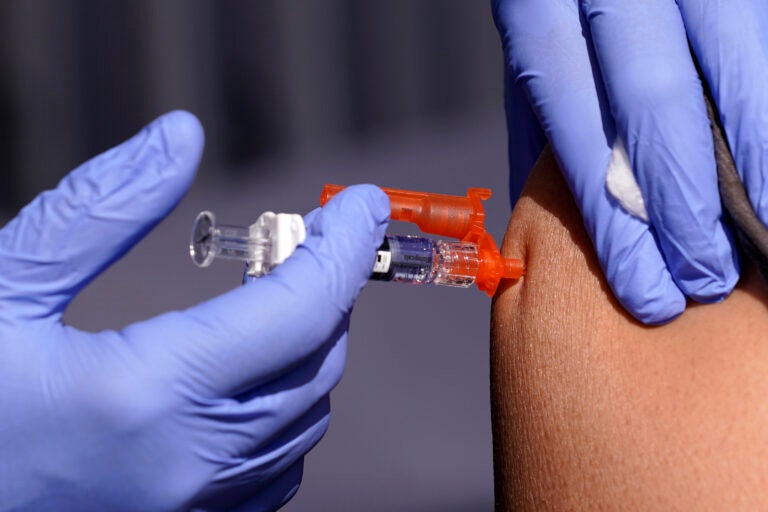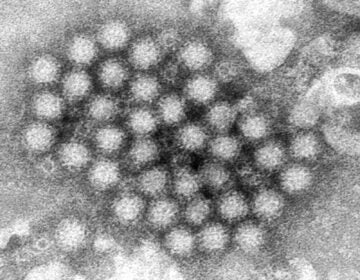Delaware Valley flu cases reach ‘very high’ levels as health providers expand testing for bird flu in humans
As emergency rooms see more patients with respiratory complications, hospitals are being asked to test for possible bird flu in humans.
Listen 1:04
People getting the flu shot this year will be vaccinated against three commonly circulating strains instead of four, after one went extinct during the pandemic. (Mark J. Terrill/AP)
From Philly and the Pa. suburbs to South Jersey and Delaware, what would you like WHYY News to cover? Let us know!
Flu activity is “high” or “very high” in the Delaware Valley right now as more people are hospitalized with complications, and the season of respiratory illnesses is not over.
On top of that, public health experts are pushing hospitals and health clinics to ramp up testing efforts to catch any potential cases of bird flu in humans.
“It is important from a public health standpoint to stay ahead of the game,” said Dr. Theresa Metanchuk, president of the Pennsylvania Academy of Family Physicians and a physician with ChristianaCare.
Nationally, there have been 70 confirmed cases of bird flu infections in people as of Friday afternoon, but none so far in Pennsylvania, New Jersey or Delaware. Most cases involved farm workers who handle chickens or dairy cattle, according to the Centers for Disease Control and Prevention.
There is no evidence of any human-to-human transmission of bird flu, experts say.
In Pennsylvania, the state health department is recommending that hospitals expedite influenza A virus subtype testing among patients who come in sick with flu, “prioritizing [intensive care unit] patients,” according to a Feb. 7 health advisory.
Subtype testing is recommended as soon as possible, “ideally within the first 24 hours of admission” to avoid any delays.
“Such delays are more likely while seasonal influenza activity is high, as it is now, due to high patient volumes and general burden on health care facilities,” the health advisory stated.
Health providers and laboratory experts are looking for positive matches to common subtypes or sub-strains of flu that are currently circulating among people, like H1 and H3. But samples that test negative should be sent to the state’s Bureau of Laboratories where they can get screened for bird flu, or specifically, avian influenza A(H5).
Metanchuk said this is important for patients who have backyard chickens or have been directly exposed to wild birds or work on poultry and cattle farms.
But the risk of bird flu infection among the general public remains low, health experts say, though there are concerns that the virus could eventually mutate and spread.
People are much more likely to become ill with one of the viral strains known to affect humans. A large majority of cases in Pennsylvania, New Jersey and Delaware are currently influenza type A infections, data shows.
“This flu A is making people pretty sick and we’re having a lot of hospitalizations,” Metanchuk said. “It’s nothing to really mess around with right now.”
Serious illness and hospitalizations are especially high in children and young adults, who may experience flu complications like difficulty breathing, high fevers and dehydration.
Among kids 4 years and younger, more than 16% of all emergency department visits in Pennsylvania last week were for the flu, according to the state Department of Health. That’s compared to just 1.7% in mid-December.
Older people and those with chronic diseases, especially ones that affect the lungs, are also at an increased risk of developing more serious illness.
Many people can manage their symptoms at home with over-the-counter fever medications or with prescribed antiviral medication, Metanchuk said.
“But if at any point you start having trouble breathing, you can’t walk around the first floor of your house comfortably … you just can’t catch your breath, those are the concerning signs,” she said. “That’s when we feel like, all right, now it’s time for the emergency room.”
Metanchuk said wearing masks and avoiding densely packed indoor spaces that have limited fresh airflow can also help lower someone’s risk of becoming sick with flu and other diseases like respiratory syncytial virus and COVID-19. Cases of the latter two are on the decline or remain low in Pennsylvania.
And, of course, there are flu vaccines.
“I know that it seems weird to say, get your flu vaccine in the middle of February, but we still have four weeks to six weeks left [of winter],” Metanchuk said. “So, getting vaccinated now can help protect you against the next surge. I think of it as, you may have survived this wave, but what wave is coming next?”

Get daily updates from WHYY News!
WHYY is your source for fact-based, in-depth journalism and information. As a nonprofit organization, we rely on financial support from readers like you. Please give today.





